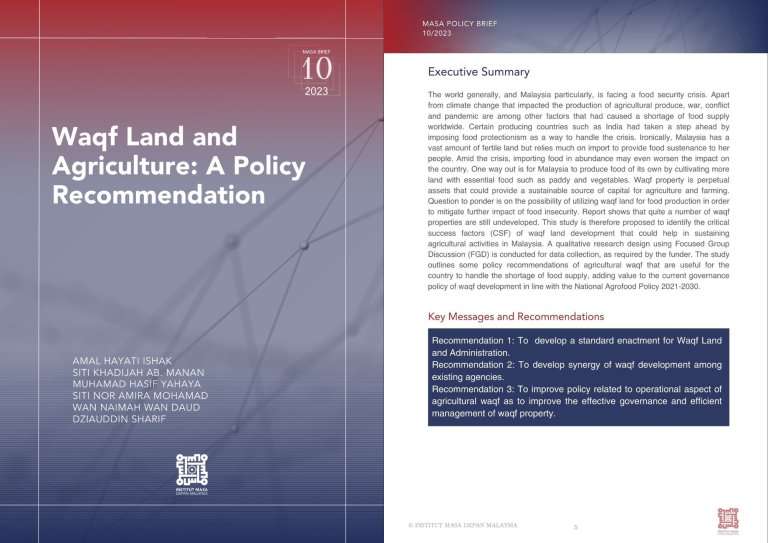The world generally, and Malaysia particularly, is facing a food security crisis. Apart from climate change that impacted the production of agricultural produce, war, conflict and pandemic are among other factors that had caused a shortage of food supply worldwide. Certain producing countries such as India had taken a step ahead by imposing food protectionism as a way to handle the crisis. Ironically, Malaysia has a vast amount of fertile land but relies much on import to provide food sustenance to her people. Amid the crisis, importing food in abundance may even worsen the impact on the country. One way out is for Malaysia to produce food of its own by cultivating more land with essential food such as paddy and vegetables. Waqf property is perpetual assets that could provide a sustainable source of capital for agriculture and farming. Question to ponder is on the possibility of utilizing waqf land for food production in order to mitigate further impact of food insecurity. Report shows that quite a number of waqf properties are still undeveloped. This study is therefore proposed to identify the critical success factors (CSF) of waqf land development that could help in sustaining agricultural activities in Malaysia. A qualitative research design using Focused Group Discussion (FGD) is conducted for data collection, as required by the funder. The study outlines some policy recommendations of agricultural waqf that are useful for the country to handle the shortage of food supply, adding value to the current governance policy of waqf development in line with the National Agrofood Policy 2021-2030.
#10: Waqf Land and Agriculture: A Policy Recommendation
- Laporan Dasar, Program Pembangunan Dasar MASA
Kongsi Artikel
Artikel Lain
Artikel
Oleh Mohamad Fauzi Ahmad Meskipun ekonomi Malaysia bergantung pada permintaan domestik, sumbangan bumiputera...
Siaran Media
KENYATAAN MEDIA 16 PENYELIDIK TERPILIH MENERIMA GERAN PENYELIDIKAN MASA 1 OGOS 2025 KUALA...
Siaran Media
KENYATAAN MEDIA TINJAUAN KAJI SELIDIK PENDAPAT UMUM MENGENAI PRESTASI PENTADBIRAN, SOSIO-EKONOMI DAN POLITIK...
Artikel
Oleh Solahuddiin Ismail Mina Jangka hayat ketika lahir adalah satu anggaran purata umur...
Artikel
Oleh Mohamad Fauzi Ahmad Meskipun ekonomi Malaysia bergantung pada permintaan domestik, sumbangan bumiputera...
Siaran Media
KENYATAAN MEDIA 16 PENYELIDIK TERPILIH MENERIMA GERAN PENYELIDIKAN MASA 1 OGOS 2025 KUALA...
Siaran Media
KENYATAAN MEDIA TINJAUAN KAJI SELIDIK PENDAPAT UMUM MENGENAI PRESTASI PENTADBIRAN, SOSIO-EKONOMI DAN POLITIK...
Artikel
Oleh Solahuddiin Ismail Mina Jangka hayat ketika lahir adalah satu anggaran purata umur...
Artikel
Oleh Mohamad Fauzi Ahmad Meskipun ekonomi Malaysia bergantung pada permintaan domestik, sumbangan bumiputera...




